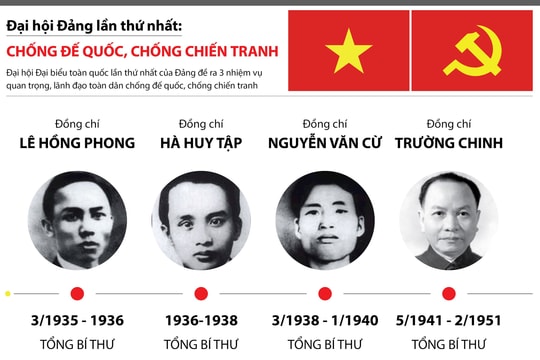The 7th Party Congress: Taking the country on the path of innovation
The 7th National Party Congress continues to carry out the task of taking the country on the path of innovation, firmly pursuing the goals of national independence and socialism.
7th Party Congress
Time:June 24 to June 27, 1991
Location:Hanoi capital
Number of delegates attending the Congress:1,176
Number of party members in the country: more than 2.1 million
The congress elected:
- General Secretary: Comrade Do Muoi
- Central Executive Committee: 146 members
- Politburo: 13 members
- Central Executive Committee Advisors: Comrades Nguyen Van Linh, Pham Van Dong, Vo Chi Cong.

GENERAL CONTEXT:
- The socialist system fell into a comprehensive and profound crisis. The Soviet Union's reform process encountered many difficulties.
Hostile forces are attacking socialism, Marxism-Leninism and the Communist Party from many sides, trying to eliminate socialism. The Cold War ended. Major powers adjusted their strategies, promoting the trend of détente and cooperation.
- After more than 4 years of implementing the Party's renewal policy, we have achieved very important initial achievements. However, there are still many difficulties and weaknesses, the country has not yet emerged from the socio-economic crisis, and many burning socio-economic issues have not been resolved.
The economic blockade and embargo against our country have not been lifted.
Our country has to cope with sabotage activities of hostile forces both at home and abroad.
CONTINUING THE RENEWAL PROCESS TO MOVE THE COUNTRY FORWARD ON THE SOCIALIST PATH
The Congress reviewed the implementation of the Resolution of the 6th Congress and passed the following resolutions: Platform for national construction during the transition period to socialism; Strategy for socio-economic stabilization and development until 2000; Report on Party building and amendments to the Party Charter.

The Congress drew initial lessons from the implementation of the renovation process. That is, it is necessary to maintain the socialist orientation in the renovation process. Comprehensive, synchronous and thorough renovation, but must have appropriate steps, forms and methods. Developing a multi-sector commodity economy must go hand in hand with strengthening the State's management role in the socio-economy. Continuing to promote socialist democracy extensively. It is necessary to pay attention to forecasting the situation, promptly detecting and correctly resolving newly arising issues in the spirit of steadfastly implementing the renovation policy; strengthening the summary of practices and constantly perfecting the theory on the path to building socialism in our country.
The Platform for National Construction in the Transitional Period to Socialism, approved by the Congress, clearly stated the characteristics of the socialist society that our people are building and the basic directions for successfully building Socialism in our country. The Platform affirmed: The socialist society that our people are building is a society:
- Owned by the working people.
- Have a highly developed economy based on modern productive forces and public ownership of major means of production.
- Has an advanced culture, rich in national identity.
- People are liberated from oppression, exploitation, injustice, work according to their ability, receive according to their labor, have a prosperous, free, happy life, and have conditions for comprehensive personal development.
- All ethnic groups in the country are equal, united and help each other to progress together.
- Have friendly relations and cooperation with people of all countries in the world.
The Congress elected the Central Executive Committee, comrade Do Muoi was elected General Secretary of the Party. Comrades Nguyen Van Linh, Pham Van Dong, and Vo Chi Cong held the important position of Advisors to the Central Executive Committee of the Party.
DOMESTIC EVENTS
- February 9, 1991: The Politburo issued Resolution No. 25-NQ/TW on innovation and strengthening the Party's leadership over youth work.
- March 30, 1991: The Politburo issued Resolution No. 26-NQ/TW on science and technology in the cause of innovation.
- May 7-13, 1991: General Secretary Nguyen Van Linh visited and worked in the Soviet Union.
- August 1991: Comrade Vo Van Kiet was elected to hold the position of Chairman of the Council of Ministers (at the 9th session, 8th National Assembly)
- September 12 and 13, 1991: Foreign investment conference in Vietnam with the name "Vietnam the awakening tiger", this was the first conference on this topic held in the US.
- November 4, 1991: Vietnam was admitted as the 156th member of the International Police Organization (Interpol)
- November 5-11, 1991: General Secretary Do Muoi and Chairman of the Council of Ministers Vo Van Kiet paid an official visit to China. This was a significant event, marking the normalization of relations between Vietnam and China.
INTERNATIONAL EVENTS
- January 16, 1991: The US and coalition launched Operation Desert Storm, starting the first Gulf War.
- April 3, 1991: The UN Security Council passed Resolution 687 on an official ceasefire in the Gulf region.
- March 31, 1991: The Warsaw Pact ceased operations.
- February 23, 1991: Military coup in Thailand to restore the military government headed by General Chaovalit.
- August 15, 1991: Laos promulgated its first constitution.
- 1991: The Soviet Union was in a high crisis, gradually collapsing: the coup began unsuccessfully (August 19); leading to MX Gorbachev announcing his resignation as General Secretary of the Communist Party of the Soviet Union, requesting the dissolution of the Central Committee (August 24); the Communist Party of the Soviet Union was suspended (August 29). On December 21, the agreement to dissolve the Soviet Union was signed, establishing the Commonwealth of Independent States (CIS), forcing MX Gorbachev to announce his resignation as President of the Soviet Union (December 25, 1991).
- December 7, 1991: Leaders of 12 countries of the European Community completed negotiations on the Maastricht Agreement, laying the foundation for the establishment of the European Union (EU).





